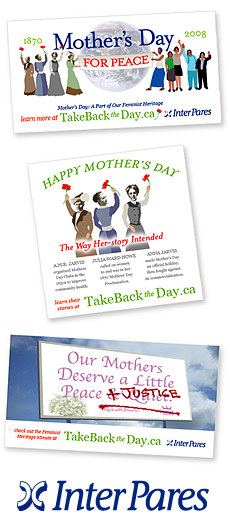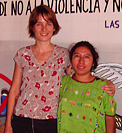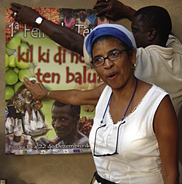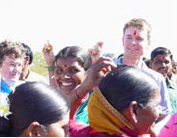
|
||||||
A 'View Between EqualsAn interview with Samantha McGavin of Inter Pares, who we've been working with on the Take Back the Day campaign. HCW: First up, let's have an intro! What is your role at Inter Pares and how long have you been there?
HCW: Now let's move on to the organization. Can you tell me more about the story of Inter Pares and its mission? SM: Inter Pares was started in 1975 by a group of young Canadian activists, some of whom had been working overseas, and some of whom were involved in community development in Canada. They were all concerned about poverty and injustice around the world and decided to create an organization to address these concerns. They weren't interested in setting up offices overseas and imposing their vision about how other countries should address their problems. They wanted to work side-by-side with activists in the South, which is where our name comes from: it means "among equals" in Latin. So we only have one office in Ottawa where we've spent the last three decades working with community groups, citizens' movements, and people around the world who are confronting social and economic injustice. Most of them are from countries that have past or present internal armed conflict and dictatorships. A number of them are women-only organizations, but the majority are mixed organizations. We also support domestic social justice work that fits into our global concerns, and bring together Canadian and international activists who share common cause. HCW: I'm sure people would like to know where their donations are going. What kinds of programs does this campaign support? SM: Inter Pares' programs are built around collaborating with other social justice organizations and supporting them in their own programs and activities. HCW: What does it mean that you're a feminist organization? SM: Our feminism affects everything to do with our work. It forms our political analysis about power imbalance, not just along gender lines, but also race, class, and geopolitical lines, and all other structural inequities. When you view the world this way then everything flows from it − the analysis of social problems in each context, the people you are drawn to as collaborators, the ethos of care and respect you bring to your relationships, the foregrounding of women's leadership within social struggles. It also shapes how we relate to each other internally. We have a non-hierarchical management system where all full-time staff receive equal salaries and share equal responsibility for the organization. HCW: Is there one social justice issue or area of the world you consider particularly important right now? SM: Since we work in such a wide variety of places, I couldn't prioritize one part of the world over another. But one major need we see, in terms of our collective action, is for movements to converge and build on each other. Feminist and anti-capitalist movements, anti-racist organizers, human rights activists, queer liberationists, war resisters, and so forth. While there are valid debates within and among movements, we are all part of the same larger struggle and we need to find more and more ways to build on and amplify each other's work. HCW: We're doing this interview for our e-zine, a joint production of Hello Cool World & The Corporation, which likens the corporation to a psychopath pursuing profit without regard for social or human costs. Is this kind of behaviour something Inter Pares has come up against? SM: Absolutely! We have seen corporations around the world focused only on profit regardless of the impact. We see it historically and we can see it today, though some of the behaviour and the context has changed. There is increased attention on corporate behaviour and calls for accountability, but also increased corporate power and spin as well. Around the world, corporate self-interest is one of several factors our colleagues must confront or negotiate when addressing social justice issues in their countries. Inter Pares co-founded a coalition called the Canadian Network on Corporate Accountability (CNCA) that brings together civil society groups concerned with Canadian companies who operate overseas, especially in the South, whose activity has detrimental human rights and environmental impacts. The CNCA is calling for the federal government to move beyond voluntary corporate social responsibility measures and to regulate corporate activity abroad, particularly extractive industries. 
HCW: And finally, do you have a favourite Inter Pares story? SM: It's hard to pick a favourite but one story I like to tell about our peacebuilding work is of an exchange we organized in 2002 between Burmese and Guatemalan women organizers. We've supported Guatemalan refugees women's organizations since they formed during the country's armed conflict. At first to ensure their access to services and inclusion in political negotiations, but in the decade since their return, to help them rebuild their communities and be recognized as political actors and leaders. We've been working with Burmese refugee women's organizations for almost as long. They address community needs, document human rights abuses, and call for a return to democracy in Burma. |
Contents
A 'View Between Equals
 Tribute Cards Snapshots of the Mother's Day cards we produced where donors can send as many as 10 cards (electronic or print). Check out the full versions at TakeBackTheDay.ca   Blogs Spot On April Reign Take back the Day What if this Mother’s Day no mother wept over the body of a child raped, blown apart by bombs, slowly starved, or sent back from war in a casket? Words Under Scars In the Arms of Mothers: A Tribute to Mother's Day gently that life fell from her soft, wet warmth sunflower from rain-drenched sky |
|||||
|

|
||||||
 SM: I'm the Communications Director at Inter Pares which includes managing our electronic communications and e-fundraising, editing our publications, and building our media relationships. Since Inter Pares works with an egalitarian co-management structure, I'm also responsible for the overall management of the organization. I've been here for nearly six years.
SM: I'm the Communications Director at Inter Pares which includes managing our electronic communications and e-fundraising, editing our publications, and building our media relationships. Since Inter Pares works with an egalitarian co-management structure, I'm also responsible for the overall management of the organization. I've been here for nearly six years.  So people's donations will support the work of a wide variety of organizations in Africa, Asia, Latin America, and Canada. While they are working in different contexts, they are all addressing structural roots of poverty, injustice, and obstacles to citizen participation, and promoting more equitable futures. Most of them work at the national level but collaborate closely with grassroots groups, and also connect internationally with others. The thread that connects our work is citizen participation, strengthening the capacity of people and communities − especially the most marginalized − to influence the social, economic, and political structures that affect their lives.
So people's donations will support the work of a wide variety of organizations in Africa, Asia, Latin America, and Canada. While they are working in different contexts, they are all addressing structural roots of poverty, injustice, and obstacles to citizen participation, and promoting more equitable futures. Most of them work at the national level but collaborate closely with grassroots groups, and also connect internationally with others. The thread that connects our work is citizen participation, strengthening the capacity of people and communities − especially the most marginalized − to influence the social, economic, and political structures that affect their lives.